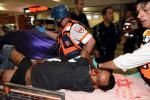Palestinian Gunman Kills One, Wounds 11 In Israeli City Of Beersheba

By Ori Lewis and Jeffrey Heller
JERUSALEM (Reuters) -- A Palestinian gunman went on a shooting rampage at the central bus station in the southern Israeli city of Beersheba on Sunday, killing a soldier and wounding 11, police said.
In one of the most serious Palestinian attacks against Israelis during this month's upsurge of violence, police said the attacker was shot dead after a protracted gun battle, police said.
A second man, an Eritrean who was mistaken for a second Palestinian terrorist, also died in the melee after being shot, according to Israel News Feed and i24News.
Palestinian media outlets named the attacker as Asam al-Araj from Shuafat, from the outskirts of Jerusalem.
A number of the wounded were police officers. Hospital officials said two people were in critical condition.
Initial reports had said two attackers were involved but the regional police commander said investigators later believed there was only one.
Police commander Yoram Halevy said the gunman had entered the secured bus station and used a pistol to kill the soldier and grab his assault rifle, which he then used to shoot others.
Forty-two Palestinians and eight Israelis have died in the recent violence, which was in part triggered by Palestinians' anger over what they see as increased Jewish encroachment on Jerusalem's al-Aqsa mosque compound.
In public remarks on Sunday to his cabinet, Prime Minister Benjamin Netanyahu said: "We are preserving the status quo, we will continue to do so," referring to the Jerusalem holy site that is also revered by Jews as the location of two destroyed biblical temples.
The Palestinian dead this month include attackers wielding knives and protesters shot by Israeli forces during violent demonstrations. Israelis have been killed in random attacks in the street or on buses.
Two of the alleged assailants in the attacks on Israelis over the past two weeks were Israeli Arabs. The others were Palestinians from occupied East Jerusalem and the West Bank.
Israel Erects Wall
Earlier on Sunday, Israel erected a short concrete barrier along a street that borders the Palestinian neighborhood of Jabel Mukabar and a Jewish neighborhood that Israel has built in annexed East Jerusalem.
Police said the wall, about 10 meters in length, was placed temporarily at a flashpoint of the recent flare-up of violence in the city and was intended to stop petrol bombs and other missiles being thrown at the Jewish apartments.
Israel, which has poured hundreds of troops into its cities and set up roadblocks in Palestinian neighborhoods of East Jerusalem, said that on Saturday four Palestinians were shot dead and a fifth seriously injured in thwarted knife attacks.
The Islamist Hamas group which controls the Gaza Strip said the Beersheba attack was a "natural response to Israel field executions of Palestinians".
As they struggle to calm public fears, at least four Israeli cities, including the commercial capital Tel Aviv, have temporarily banned Arab workers from their schools.
The Interior Ministry, which oversees the municipalities, said it had appealed to "all mayors to continue to act with respect and equality towards all their workers, irrespective of religion, ethnicity or gender". It did not ask them to repeal the restrictions.
In a further precautionary measure on Sunday, Israel's cabinet widened police stop-and-frisk powers that will effectively allow them to search anyone on the street.
Netanyahu is expected to meet U.S. Secretary of State John Kerry in Germany in the coming week as part of an effort by Washington to restore calm. Kerry also plans to hold talks in the Middle East with Palestinian President Mahmoud Abbas, but no precise location has been announced.
Israel regards all Jerusalem, including the predominantly Arab east captured and annexed in 1967, as its "indivisible capital" -- a claim not recognized internationally -- and its right-wing government is wary of being portrayed as dividing the city.
Palestinians want the occupied West Bank and the Gaza Strip for a future state with Arab East Jerusalem as its capital.
© Copyright Thomson Reuters 2024. All rights reserved.





















